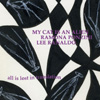My Cat is an Alien/Ramona Ponzini/Lee Ranaldo, "All is Lost in Translation"
 Sonic Youth and the Opalio Brothers both share a definite propensity towards ambitious and fruitful international collaborations, so it was pretty much inevitable that they'd wind up occasionally intermingling.  In fact, this live Verona performance is actually the second time that these four musicians have shared a stage, having previously performed with Dead C's Michael Morley in 2008 as part of a French art exhibition.  In theory, the combination of Ranaldo's tumultuous guitar noise, Ponzini's Japanese percussion, and Roberto Opalio's weird sci-fi toys has the potential to be something quite spectacular.  The reality is a bit less than that, but this album definitely has its share of compelling moments.
Sonic Youth and the Opalio Brothers both share a definite propensity towards ambitious and fruitful international collaborations, so it was pretty much inevitable that they'd wind up occasionally intermingling.  In fact, this live Verona performance is actually the second time that these four musicians have shared a stage, having previously performed with Dead C's Michael Morley in 2008 as part of a French art exhibition.  In theory, the combination of Ranaldo's tumultuous guitar noise, Ponzini's Japanese percussion, and Roberto Opalio's weird sci-fi toys has the potential to be something quite spectacular.  The reality is a bit less than that, but this album definitely has its share of compelling moments.
Ramona Ponzini is not as well-known as this session's other participants, but she has been working with the Opalio brothers for quite some time in projects like Black Magic Disco and plays a very prominent role in All is Lost in Translation.  The first of the two lengthy pieces is centered around her recitation (in Japanese, presumably) of some poetry by proto-feminist Yosano Akiko.  That doesn't start for about ten minutes though and the build-up to it is quite nice: a fragile guitar motif twinkles beneath an array of chimes, bells, echo-heavy voice recordings, and Roberto Opalio's wordless falsetto vocal swoops.  It all feels strangely sacred, like a recording of some bizarre cult, but it is charmingly disrupted from time to time by laser sounds and other futuristic noises from Roberto's eclectic assortment of toys and electronics.  Gradually, however,  the guitars and electronics get more and more pronounced and both Maurizio Opalio's cymbals and Ponzini's hand-percussion grow steadily more active as the piece builds to its slow-burning climax.
Unfortunately, the work is torpedoed a bit by some unfortunate irony, as Lee Ranaldo attempts to amp up the intensity with some of his own English-language poetry that is not lost in translation.  It seems like his words are intended to play off and enhance Ponzini's, but his incessant shouted variations of "kick me in the head!" definitely shatter the piece's mantric/ritualistic feel for me and turn the proceedings into something approaching avant-garde theater or performance art.  It's quite exasperating because everything else works so well, but I guess that is one of the perils of improvising: some ideas just don't work as well as others.  The piece nearly gets its momentum back when it dissolves into an electronic blizzard of burbles and whooshes, but then Ranaldo chimes in with an ill-timed "I didn't mean to kick you in the head–I was only trying to get elected," causing me to involuntarily grimace.  Then it derails yet again during the otherwise sublime chanted outro, as Lee begins loudly demanding to now be hit in the head.  I'd love to think that he is making some extremely clever point about the limitations of language or something that is way over my head, but my gut tells me otherwise.
The second and final song is a bit more cacophonous and rhythmic, as Ranaldo's guitar squalls, howls, and feeds back over an actual drum beat and some avian and insectoid electronic twittering.  After about five minutes, however, the louder elements drop out and Ramona returns to the microphone to intone some more poetry over woozy harmonics and a bed of layered moans.  Then, to my utter disbelief, Lee starts demanding to be kicked in the head yet again, only a bit more impassioned than he was earlier.  He also starts wildly yelping before the piece gently ebbs to a close with a steadily dwindling flurry of dissonant guitar noise and space-y electronics.
I can't describe All is Lost in Translation as anything other than inspired, but deeply frustrating: most of it is quite good, but the not-so-good parts tend to be the most prominent.  Ranaldo definitely had the right idea in a larger sense, as his vocal contributions brought some welcome passion and unpredictability to the performance, but the actual content did not serve the surrounding music particularly well.  There is definitely a lot to like but this album is probably too uneven to offer much appeal to anyone that is not already an existing fan of the parties involved.
Samples:
 



